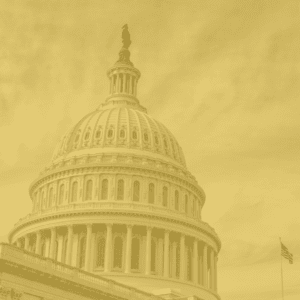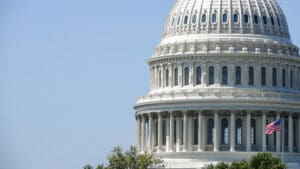
Garrett Watson is Director of Policy Analysis at the Tax Foundation, where he conducts research on federal and state tax policy. His work has been featured in The Washington Post, The Atlantic, Politico, the Associated Press and other major outlets.
Previously, Garrett was a program manager at a nearby think tank and conducted policy research on economic opportunity and labor markets, including non-compete clause reform.
Garrett earned a bachelor’s degree from St. Lawrence University in upstate New York, where he studied economics and philosophy. Garrett lives in northwest Arkansas and is an avid hockey fan and snowboarder.
Latest Work


“Big Beautiful Bill” House GOP Tax Plan: Preliminary Details and Analysis
Our preliminary analysis finds the tax provisions increase long-run GDP by 0.8 percent and reduce federal tax revenue by $4.0 trillion from 2025 through 2034 on a conventional basis before added interest costs.
9 min read
Congressional Tax Writers and Scorekeepers You Should Know
When you hear about tax policy, you may think of the IRS, the agency responsible for collecting federal taxes. But who is responsible for drafting, reviewing, assessing, and passing tax legislation at the federal level?
4 min read
One, Big, Beautiful Bill: The Good, the Bad, and the Ugly
From generous tax breaks to costly trade-offs, the House GOP’s One, Big, Beautiful Bill has a little of everything. It’s a sweeping attempt to extend key provisions of the 2017 Tax Cuts and Jobs Act before they expire in 2026—but what’s actually in it?

Budget Reconciliation: Tracking the 2025 Trump Tax Cuts
Our experts are providing the latest details and analysis of proposed federal tax policy changes.
13 min read
A More Generous SALT Deduction Cap in the Big, Beautiful Bill Would Cost Revenue and Primarily Benefit High Earners
Letting the SALT cap slip further upwards would undercut the TCJA’s long-term legacy, worsening the fiscal outlook of the tax package and providing an unneeded benefit to higher earners.
4 min read
The One Big Beautiful Bill, Explained
We break down the House GOP’s One, Big, Beautiful Bill—a sweeping tax package designed to extend key parts of the 2017 Tax Cuts and Jobs Act before they expire in 2026.

Three Corporate Tax Hikes That Would Undermine TCJA’s Improvements to Competitiveness
As lawmakers consider options for budgetary offsets, they should prioritize competitiveness and economic growth, as a heavier corporate tax burden will undermine the core purpose and achievement of the TCJA.
24 min read
House Tax Package Could Double Economic Growth Impact by Prioritizing Permanence for TCJA Business Provisions
As the current tax package stands, the House’s use of temporary policy is leaving most of the economic growth opportunities on the table.
2 min read
Disallowing Business SALT Raises Significant Revenue for Reconciliation but Slows Economic Growth
Pairing permanent TCJA individual tax cuts with new limits on business SALT deductions would shrink the economy, reduce American incomes, and increase the federal budget deficit, undermining the policy goals of TCJA permanence.
3 min read
Raising the Top Income Tax Rate Would Offset Economic Benefits of TCJA Individual Permanence
Raising the top income tax rate would raise several hundred billion dollars but would offset most of the pro-growth effects of making the TCJA’s individual tax provisions permanent by reducing incentives to work and invest.
5 min read
The Truth About Tariffs—Fact-Checking Trump’s Trade Claims
Do tariffs really level the playing field, or are they just bad economics? In this emergency episode, we fact-check the Trump administration’s claims that retaliatory tariffs make trade fairer.

The Global Tax Deal, Tax Cuts, and Tariffs—5 Major Tax Debates
What are the biggest tax stories shaping policy today—and what do they mean for you? In our 100th episode, we break down the five biggest tax stories, from the global tax deal to the looming expiration of the Tax Cuts and Jobs Act.

Growth Should Be a Key Consideration if Corporate SALT Is Limited
Lawmakers should prioritize pro-growth tax policies and use the least economically damaging offsets to make the legislation fiscally responsible. If lawmakers choose to use C-SALT, they should carefully consider the economic trade-off with permanent, pro-growth tax cuts that support investment and innovation in the US.
7 min read
Overview of the Tax Foundation’s General Equilibrium Model
The Tax Foundation uses and maintains a General Equilibrium Model, known as our Taxes and Growth (TAG) Model to simulate the effects of government tax and spending policies on the economy and on government revenues and budgets.
9 min read
Congressional Policymakers Should Tread Carefully When Weighing New Corporate SALT Deduction Limits
While capping C-SALT has superficial appeal in perceived parity with personal limits, it rests on flawed assumptions about the nature of individual and corporate income taxes.
7 min read
Making the Tax Cuts and Jobs Act Permanent: Economic, Revenue, and Distributional Effects
Permanently extending the Tax Cuts and Jobs Act would boost long-run economic output by 1.1 percent, the capital stock by 0.7 percent, wages by 0.5 percent, and hours worked by 847,000 full-time equivalent jobs.
6 min read
Tax Policy and the US Economy: Enhancements to Our Modeling Framework
The Tax Foundation models tax policy using our proprietary Taxes and Growth model, illustrating the economic, revenue, and distributional impacts of different changes to the federal tax code. We’ve recently implemented improvements to the model that have been underway for the past several years, and we will be detailing them further in our forthcoming model methodology update.
4 min read
New Efforts on Taxing Endowments Raise Questions on Neutrality and Revenue Collection
Republican policymakers in Congress are considering options to raise revenue as part of their expected legislative package in 2025. One such option involves raising the tax rate on university endowments first put in place as part of the TCJA in 2017.
4 min read
The Unsustainable US Debt Course and Impacts of Potential Tax Changes
Given the poor state of the budget process and worsening debt trajectory, lawmakers should move boldly and quickly to address the issue, including via a fiscal commission process. Issues to consider should include reforms to both spending and taxes.
42 min read